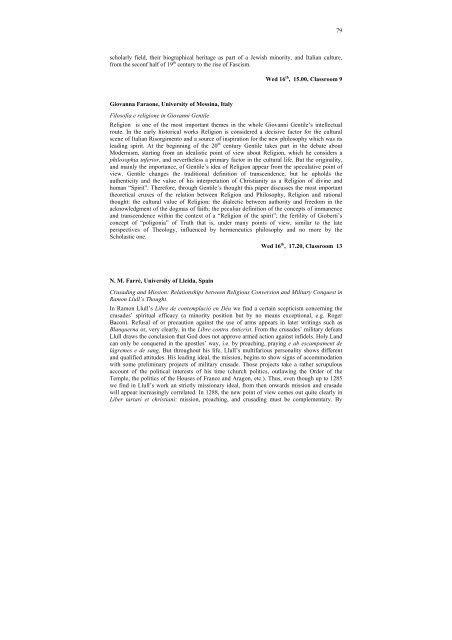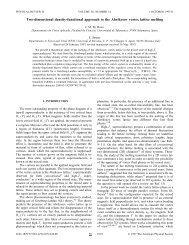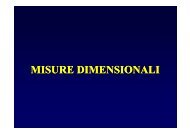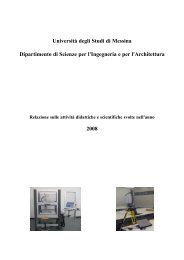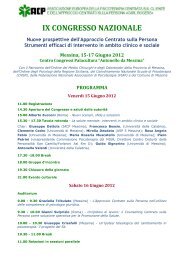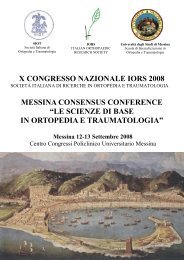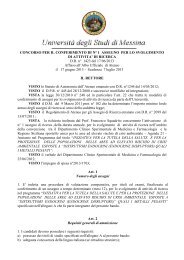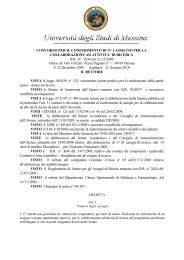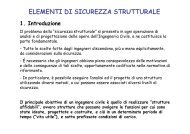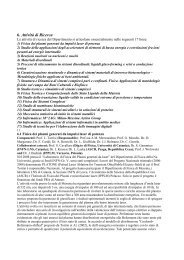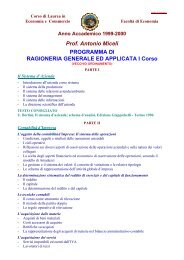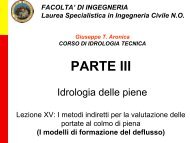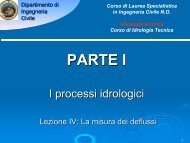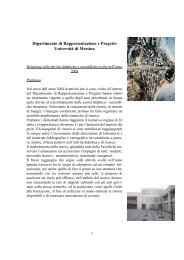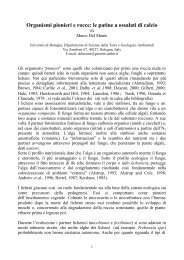PROGRAMME AND ABSTRACTS - Università degli Studi di Messina
PROGRAMME AND ABSTRACTS - Università degli Studi di Messina
PROGRAMME AND ABSTRACTS - Università degli Studi di Messina
You also want an ePaper? Increase the reach of your titles
YUMPU automatically turns print PDFs into web optimized ePapers that Google loves.
scholarly field, their biographical heritage as part of a Jewish minority, and Italian culture,<br />
from the seconf half of 19 th century to the rise of Fascism.<br />
Giovanna Faraone, University of <strong>Messina</strong>, Italy<br />
Filosofia e religione in Giovanni Gentile<br />
79<br />
Wed 16 th , 15.00, Classroom 9<br />
Religion is one of the most important themes in the whole Giovanni Gentile’s intellectual<br />
route. In the early historical works Religion is considered a decisive factor for the cultural<br />
scene of Italian Risorgimento and a source of inspiration for the new philosophy which was its<br />
lea<strong>di</strong>ng spirit. At the beginning of the 20 th century Gentile takes part in the debate about<br />
Modernism, starting from an idealistic point of view about Religion, which he considers a<br />
philosophia inferior, and nevertheless a primary factor in the cultural life. But the originality,<br />
and mainly the importance, of Gentile’s idea of Religion appear from the speculative point of<br />
view. Gentile changes the tra<strong>di</strong>tional definition of transcendence, but he upholds the<br />
authenticity and the value of his interpretation of Christianity as a Religion of <strong>di</strong>vine and<br />
human “Spirit”. Therefore, through Gentile’s thought this paper <strong>di</strong>scusses the most important<br />
theoretical cruxes of the relation between Religion and Philosophy, Religion and rational<br />
thought: the cultural value of Religion; the <strong>di</strong>alectic between authority and freedom in the<br />
acknowledgment of the dogmas of faith; the peculiar definition of the concepts of immanence<br />
and transcendence within the context of a “Religion of the spirit”; the fertility of Gioberti’s<br />
concept of “poligonia” of Truth that is, under many points of view, similar to the late<br />
perspectives of Theology, influenced by hermeneutics philosophy and no more by the<br />
Scholastic one.<br />
N. M. Farrè, University of Lleida, Spain<br />
Wed 16 th , 17.20, Classroom 13<br />
Crusa<strong>di</strong>ng and Mission: Relationships between Religious Conversion and Military Conquest in<br />
Ramon Llull’s Thought.<br />
In Ramon Llull’s Libre de contemplació en Déu we find a certain scepticism concerning the<br />
crusades’ spiritual efficacy (a minority position but by no means exceptional, e.g. Roger<br />
Bacon). Refusal of or precaution against the use of arms appears in later writings such as<br />
Blanquerna or, very clearly, in the Libre contra Anticrist. From the crusades’ military defeats<br />
Llull draws the conclusion that God does not approve armed action against infidels. Holy Land<br />
can only be conquered in the apostles’ way, i.e. by preaching, praying e ab escampament de<br />
làgremes e de sang. But throughout his life, Llull’s multifarious personality shows <strong>di</strong>fferent<br />
and qualified attitudes. His lea<strong>di</strong>ng ideal, the mission, begins to show signs of accommodation<br />
with some preliminary projects of military crusade. Those projects take a rather scrupulous<br />
account of the political interests of his time (church politics, outlawing the Order of the<br />
Temple, the politics of the Houses of France and Aragon, etc.). Thus, even though up to 1285<br />
we find in Llull’s work an strictly missionary ideal, from then onwards mission and crusade<br />
will appear increasingly correlated. In 1288, the new point of view comes out quite clearly in<br />
Liber tartari et christiani: mission, preaching, and crusa<strong>di</strong>ng must be complementary. By


